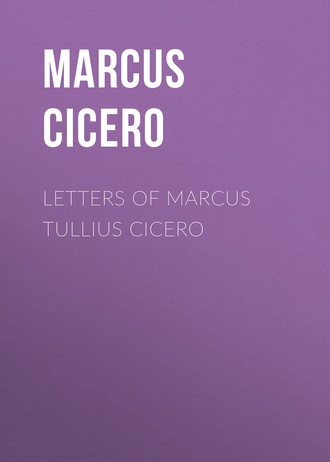 полная версия
полная версияLetters of Marcus Tullius Cicero
XI
To M. FADIUS GALLU5ROME (MAY)I HAD only just arrived from Arpinum when your letter was delivered to me; and from the same bearer I received a letter from Avianius, in which there was this most liberal offer, that when he came to Rome he would enter my debt to him on whatever day I chose. Pray put yourself in my place: is it consistent with your modesty or mine, first to prefer a request as to the day, and then to ask more than a year's credit? But, my dear Gallus, everything would have been easy, if you had bought the things I wanted, and only up to the price that I wished. However, the purchases which, according to your letter, you have made shall not only be ratified by me, but with gratitude besides: for I fully understand that you have displayed zeal and affection in purchasing (because you thought them worthy of me) things which pleased yourself—a man, as I have ever thought, of the most fastidious judgment in all matters of taste. Still, I should like Damasippus to abide by his decision: for there is absolutely none of those purchases that I care to have. But you, being unacquainted with my habits, have bought four or five of your selection at a price at which I do not value any statues in the world. You compare your Bacchae with Metellus's Muses. Where is the likeness? To begin with, I should never have considered the Muses worth all that money, and I think all the Muses would have approved my judgment: still, it would have been appropriate to a library, and in harmony with my pursuits But Bacchae! What place is there in my house for them? But, you will say, they are pretty. I know them very well and have often seem them. I would have commissioned you definitely in the case of statues known to me, if I had decided on them. The sort of statues that I am accustomed to buy are such as may adorn a place in a pala stra after the fashion of gymnasia. What, again, have I, the promoter of peace, to do with a statue of Mars? I am glad there was not a statue of Saturn also: for I should have thought these two statues had brought mc debt! I should have preferred some representation of Mercury: I might then, I suppose, have made a more favourable bargain with Arrianus. You say you meant the table-stand for yourself; well, if you like it, keep it. But if you have changed your mind I will, of course, have it. For the money you have laid out, indeed, I would rather have purchased a place of call at Tarracina, to prevent my being always a burden on my host. Altogether I perceive that the fault is with my freedman, whom I had distinctly commissioned to purchase certain definite things, and also with lunius, whom I think you know, an intimate friend of Avianius. I have constructed some new sitting-rooms in a miniature colonnade on my Tusculan property. I want to ornament them with pictures: for if I take pleasure in anything of that sort it is in painting. However, if I am to have what you have bought, I should like you to inform me where they are, when they are to be fetched, and by what kind of conveyance. For if Damasippus doesn't abide by his decision, I shall look for some would-be Damasippus, even at a loss.
As to what you say about the house, as I was going out of town I intrusted the matter to my daughter Tullia: for it 'vas at the very hour of my departure that I got your letter. I also discussed the matter with your friend Nicias, because he is, as you know, intimate with Cassius. On my return, however, before I got your last letter, I asked Tullia what she had done. She said that she had approached Licinia (though I think Cassius is not very intimate with his sister), and that she at once said that she could venture, in the absence of her husband (Dexius is gone to Spain), to change houses without his being there and knowing about it.. I am much gratified that you should value association with me and my domestic life so highly, as, in the first place, to take a house which would enable you to live not only near me, but absolutely with me, and, in the second place, to be in such a hurry to make this change of residence. But, upon my life, I do not yield to you in eagerness for that arrangement. So I will try every means in my power. For I see the advantage to myself, and, indeed, the advantages to us both. If I succeed in doing anything, I will let you know. Mind you also write me word back on everything, and let me know, if you please, when I am to expect you..
XII
To M. MARIUS (AT CUMAE)ROME (OCTOBER?)IF some bodily pain or weakness of health has prevented your coming to the games, I put it down to fortune rather than your own wisdom: but if you have made up your mind that these things which the rest of the world admires are only worthy of contempt, and, though your health would have allowed of it, you yet were unwilling to come, then I rejoice at both facts—that you were free from bodily pain, and that you had the sound sense to disdain what others causelessly admire. Only I hope that some fruit of your leisure may be forthcoming, a leisure, indeed, which you had a splendid opportunity of enjoying to the full, seeing that you were left almost alone in your lovely country. For I doubt not that in that study of yours, from which you have opened a window into the Stabian waters of the bay, and obtained a view of Misenum, you have spent the morning hours of those days in light reading, while those who left you there were watching the ordinary farces half asleep. The remaining parts of the day, too, you spent in the pleasures which you had yourself arranged to suit your own taste, while we had to endure whatever had met with the approval of Spurius Maecius. On the whole, if you care to know, the games were most splendid, but not to your taste. I judge from my own. For, to begin with, as a special honour to the occasion, those actors had come back to the stage who, I thought, had left it for their own. Indeed, your favourite, my friend Aesop, was in such a state that no one could say a word against his retiring from the profession. On beginning to recite the oath his voice failed him at the words "If I knowingly deceive." Why should I go on with the story? You know all about the rest of the games, which hadn't even that amount of charm which games on a moderate scale generally have: for the spectacle was so elaborate as to leave no room for cheerful enjoyment, and I think you need feel no regret at having missed it. For what is the pleasure of a train of six hundred mules in the "Clytemnestra," or three thousand bowls in the "Trojan Horse," or gay-colored armour of infantry and cavalry in some battle? These things roused the admiration of the vulgar; to you they would have brought no delight. But if during those days you listened to your reader Protogenes, so long at least as he read anything rather than my speeches, surely you had far greater pleasure than any one of us. For I don't suppose you wanted to see Greek or Oscan plays, especially as you can see Oscan farces in your senate-house over there, while you are so far from liking Greeks, that you generally won't even go along the Greek road to your villa Why, again, should I suppose you to care about missing the athletes, since you disdained the gladiators? in which even Pompey himself confesses that he lost his trouble and his pains. There remain the two wild-beast hunts, lasting five days, magnificent—nobody denies it—and yet, what pleasure can it be to a man of refinement, when either a weak man is torn by an extremely powerful animal, or a splendid animal is transfixed by a hunting spear? Things which, after all, if worth seeing, you have often seen before; nor did I, who was present at the games, see anything the least new. The last day was that of the elephants, on which there was a great deal of astonishment on the part of the vulgar crowd, but no pleasure whatever. Nay, there was even a certain feeling of compassion aroused by it, and a kitid of belief created that that animal has soniethirig in common with mankind. However, for my part, during this day, while the theatrical exhibitions were on, lest by chance you should think me too blessed, I almost split my lungs in defending your friend Caninius Gallus. But if the people were as indulgent to me as they were to Aesop, I would, by heaven, have been glad to abandon my profession and live with you and others like us. The fact is I was tired of it before, even when both age and ambition stirred me on, and when I could also decline any defence that I didn't like; but now, with things in the state that they are, there is no life worth having. For, on the one hand, I expect no profit of my labor; and, on the other, I am sometimes forced to defend men who have been no friends to me, at the request of those to whom I am under obligations. Accordingly, I am on the look-out for every excuse for at last managing my life according to my own taste, and I loudly applaud and vehemently approve both you and your retired plan of life: and as to your infrequent appearances among us, I am the more resigned to that because, were you in Rome, I should be prevented from enjoying the charm of your society, and so would you of mine, if I have any, by the overpowering nature of my engagements; from which, if I get any relief—for entire release I don't expect—I will give even you, who have been studying nothing else for many years, some hints as to what it is to live a life of cultivated enjoyment. Only be careful to nurse your weak health and to continue your present care of it, so that you may be able to visit my country houses and make excursions with me in my litter. I have written you a longer letter than usual, from superabundance, not of leisure, but of affection, because, if you remember, you asked me in one of your letters to write you something to prevent you feeling sorry at having missed the games. And if I have succeeded in that, I am glad: if not, I yet console myself with this reflexion, that in future you will both come to the games and come to see me, and will not leave your hope of enjoyment dependent on my letters.
XIII
To His BROTHER QUINTUS (IN THE COUNTRY)ROME (FEBRUARY)YOUR note by its strong language has drawn out this letter. For as to what actually occurred on the day of your start, it supplied me with absoutely no subject for writing. But as when we are together we are never at a loss for something to say, so ought our letters at times to digress into loose chat. Well then, to begin, the liberty of the Tenedians has received short shrift, no one speaking for them except myself, Bibulus, Calidius, and Favonius. A complimentary reference to you was made by the legates from Magnesia and Sipylum, they saying that you were the man who alone had resisted the demand of L. Sestius Pansa. On the remaining days of this business in the senate, if anything occurs which you ought to know, or even if there is nothing, I will write you something every day. On the 12th I will not fail you or Pomponius. The poems of Lucretius are as you say— with many flashes of genius, yet very technical. But when you return, . . . if you succeed in reading the Empedoclea of Sallustius, I shall regard you as a hero, yet scarcely human.
XLV
To His BROTHER QUINTUS (IN BRITAIN)ARPINUM AND ROME, 28 SEPTEMBERAFTER extraordinary hot weather—I never remember greater heat—I have refreshed myself at Arpinum, and enjoyed the extreme loveliness of the river during the days of the games, having left my tribesmen under the charge of Philotimus. I was at Arcanum on the ioth of September. There I found Mescidius and Philoxenus, and saw the water, for which they were making a course not far from your villa, running quite nicely, especially considering the extreme drought, and they said they were going to collect it in much greater abundance. Everything is right with Herus. In your Manilian property I came across Diphilus outdoing himself in dilatoriness. Still, he had nothing left to construct, except baths, and a promenade, and an aviary. I liked that villa very much, because its paved colonnade gives it an air of very great dignity. I never appreciated this till now that the colonnade itself has been all laid open, and the columns have been polished. It all depends—and this I will look to—upon the stuccoing being prettily done. The pavements seemed to be being well laid. Certain of the ceilings I did not like, and ordered them to be changed. As to the place in which they say that you write word that a small entrance hall is to be built—namely, in the colonnade—I liked it better as it is. For 1 did not think there was space sufficient for an entrance hall; nor is it usual to have one, except in those buildings which have a larger court; nor could it have bedrooms and apartments of that kind attached to it. As it is, from the very beauty of its arched roof, it will serve as an admirable summer room. However, if you think differently, write back word as soon as possible. In the bath I have moved the hot chamber to the other corner of the dressing-room, because it was so placed that its steampipe was immediately under the bedrooms. A fair-sized bed-room and a lofty winter one I admired very much, for they were both spacious and well-situated—on the side of the promenade nearest to the bath. Diphilus had placed the columns out of the perpendicular, and not opposite each other. These, of course, he shall take down; he will learn some day to use the plumb-line and measure. On the whole, I hope Diphilus's work will be completed in a few months: for Qesius, who was with me at the time, keeps a very sharp look-out upon him.
Thence I started straight along the via Vitularia to your Fufidianum, the estate which we bought for you a few weeks ago at Arpinum for 100,000 sesterces (about 8oo pounds). I never saw a shadier spot in summer—water springs in many parts of it, and abundant into the bargain. In short, Caesius thought that you would easily irrigate fifty iugera of the meadow land. For my part, I can assure you of this, which is more in my line, that you will have a villa marvellously pleasant, with the addition of a fish-pond, spouting fountains, a pakestra, and a shrubbery. I am told that you wish to keep this Bovillae estate. You will determine as you think good. Calvus said that, even if the control of the water were taken from you, and the right of drawing it off were established by the vendor, and thus an easement were imposed on that property, we could yet maintain the price in case we wish to sell. He said that he had agreed with you to do the work at three sesterces a foot, and that he had stepped it, and made it three miles. It seemed to me more. But I will guarantee that the money could nowhere be better laid out. I had sent for Cillo from Venafrum, but on that very day four of his fellow servants and apprentices bad been crushed by the falling in of a tunnel at Venafrum. On the 23th of September I was at Laterium. I examined the road, which appeared to me to be so good as to Seem almost like a high road, except a hundred and fifty paces—for I measured it myself from the little bridge at the temple of Furina, in the direction of Satricum. There they had put down dust, not gravel (this shall he changed), and that part of the road is a very steep incline. But I understood that it could not be taken in any other direction, particularly as you did not wish it to go through the property of Locusta or Varro. The latter alone had made the road very well where it skirted his own property. Locusta hadn't touched it; but I will call on him at Rome, and think I shall be able to stir him up, and at the same tune I think I shall ask M. Tarus, who is now at Rome, and whom I am told promised to allow you to do so, about making a watercourse through his property. I much approved of your steward Nicephorius and I asked him what orders you had given about that small building at Laterium, about which you spoke to me. He told me in answer that he had himself contracted to do the work for sixteen sestertia (about 128 pounds), but that you had afterwards made many additions to the work, but nothing to the price, and that he had therefore given it up. I quite approve by Hercules, of your making the additions you had determined upon; although the villa as it stands seems to have the air of a philosopher, meant to rebuke the extravagance of other villas. Yet, after all, that addition will be pleasing. I praised your landscape gardener: he has so covered everything with ivy, both the foundation-wall of the villa and the spaces between the columns of the walk, that, upon my word, those Greek statues seemed to be engaged in fancy gardening, and to be shewing off the ivy. Finally, nothing can be cooler or more mossy than the dressing-room of the bath. That is about all I have to say about country matters. The gardener, indeed, as well as Philotimus and Cincius are pressing on the ornamentation of your town house; but I also often look in upon it myself, as I can do without difficulty. Wherefore don't be at all anxious about that.
As to your always asking me about your son, of course I "excuse you"; but I must ask you to "excuse" me also, for I don't allow that you love him more than I do. And oh that he had been with me these last few days at Arpinum, as he had himself set his heart on being, and as I had no less done! As to Pomponia, please write and say that, when I go out of town anywhere, she is to come with me and bring the boy. I'll do wonders with him, if I get him to myself when I am at leisure: for at Rome there is no time to breathe. You know I formerly promised to do so for nothing. What do you expect with such a reward as you promise me? I now come to your letters which I received in several packets when I was at Arpinum. For I received three from you in one day, and, indeed, as it seemed, despatched by you at the same time—one of considerable length, in which your first point was that my letter to you was dated earlier than that to Caesar. Oppius at times cannot help this: the reason is that, having settled to send letter-carriers, and having received a letter from me, he is hindered by something turning up, and obliged to despatch them later than he had intended; and I don't take the trouble to have the day altered on a letter which I have once handed to him. You write about Caesar's extreme affection for us. This affection you must on your part keep warm, and I for mine will endeavour to increase it by every means in my power. About Pompey, I am carefully acting, and shall continue to act, as you advise. That my permission to you to stay longer is a welcome one, though I grieve at your absence and miss you exceedingly, 1 am yet partly glad. What you can be thinking of in sending for such people as Hippodamus and some others, I do not understand. There is not one of those fellows that won't expect a present from you equal to a suburban estate. However, there is no reason for your classing my friend Trebatius with them. I sent him to Caesar, and Caesar has done all I expected. If he has not done quite what he expected himself, I am not bound to make it up to him, and I in like manner free and absolve you from all claims on his part. Your remark, that you are a greater favourite with Caesar every day, is a source of undying satisfaction to me. As to Balbus, who, as you say, promotes that state of things, he is the apple of my eye. I am indeed glad that you and my friend Trebonius like each other. As to what you say about the military tribuneship, I, indeed, asked for it definitely for Curtius, and Caeesar wrote back definitely to say that there was one at Curtius's service, and chided me for my modesty in making the request. If I have asked one for anyone else—as I told Oppius to write and tell Caesar—I shall not be at all annoyed by a refusal, since those who pester me for letters are annoyed at a refusal from me. I like Curtius, as I have told him, not only because you asked me to do so, but from the character you gave of him; for from your letter I have gathered the zeal he shewed for my restoration. As for the British expedition, I conclude from your letter that we have no occasion either for fear or exultation. As to public affairs, about which you wish Tiro to write to you, I have written to you hitherto somewhat more carelessly than usual, because I knew that all events, small or great, were reported to Caesar. I have now answered your longest letter.
Now hear what I have to say to your small one. The first point is about Clodius's letter to Caesar. In that matter I approve of Caesar's policy, in not having given way to your request so far as to write a single word to that Fury. The next thing is about the speech of Calventius "Marius." I am surprised at your saying that you think I ought to answer it, particularly as, while no one is likely to read that speech, unless I write an answer to it, every schoolboy learns mine against him as an exercise. My books, all of which you are expecting, I have begun, but I cannot finish them for some days yet. The speeches for Scaurus and Plancius which you clamour for I have finished. The poem to Caesar, which I had begun, I have cut short. I will write what you ask me for, since your poetic springs are running dry, as soon as I have time.
Now for the third letter. It is very pleasant and welcome news to hear from you that Balbus is soon coming to Rome, and so well accompanied! and will stay with me continuously till the 15th of May. As to your exhorting me in the same letter, as in many previous ones, to ambition and labour, I shall, of course, do as you say: but when am I to enjoy any real life?
Your fourth letter reached me on the 13th of September, dated on the ioth of August from Britain. In it there was nothing new except about your Erigona, and if I get that from Oppius I will write and tell you what I think of it. I have no doubt I shall like it. Oh yes! I had almost forgotten to remark as to the man who, you say in your letter, had written to Qesar about the applause given to Milo— I am not unwilling that Caesar should think that it was as warm as possible. And in point of fact it was so, and yet that applause, which is given to him, seems in a certain sense to be given to me.
I have also received a very old letter, but which was late in coming into my hands, in which you remind me about the temple of Tellus and the colonnade of Catulus. Both of these matters are being actively carried out. At the temple of Tellus I have even got your statue placed. So, again, as to your reminder about a suburban villa and gardens, I was never very keen for one, and now my town house has all the charm of such a pleasure-ground. On my arrival in Rome on the 18th of September I found the roof on your house finished: the part over the sitting-rooms, which you did not wish to have many gables, now slopes gracefully towards the roof of the lower colonnade. Our boy, in my absence, did not cease working with his rhetoric master. You have no reason for being anxious about his education, for you know his ability, and I see his application. Everything else I take it upon myself to guarantee, with full consciousness that I am bound to make it good.
As yet there are three parties prosecuting Gabinius: first, L. Lentulus, son of the flainen, who has entered a prosecution for lese majeste; secondly, Tib. Nero with good names at the back of his indictment; thirdly, C. Memmius the tribune in conjunction with L. Capito. He came to the walls of the city on the 19th of September, undignified and neglected to the last degree. But in the present state of the law courts I do not venture to be confident of anything. As Cato is unwell, he has not yet been formally indicted for extortion. Pompey is trying hard to persuade me to be reconciled to him, but as yet he has not yet succeeded at all, nor, if I retain a shred of liberty, will he succeed. I am very anxious for a letter from you. You say that you have been told that I was a party to the coalition of the consular candidates—it is a lie. The compacts male in that coalition afterwards made public by Memmius, were of such a nature that no loyal man ought to have been a party to them; nor at the same time was it possible for me to be a party to a coalition from which Messalla was excluded, who is thoroughly satisfied with my conduct in every particular, as also, I think, is Memmius. To Domitius himself I have rendered many services which he desired and asked of me. I have put Scaurus under a heavy obligation by my defence of him. It is as yet very uncertain both when the elections will be and who will be consuls.
Just as I was folding up this epistle letter-carriers arrived from you and Caesar (20th September) after a journey of twenty days. How anxious I was! How painfully I was affected by Caesar's most kind letter! But the kinder it was, the more sorrow did his loss occasion me. But to turn to your letter. To begin with, I reiterate my approval of your staying on, especially as, according to your account, you have consulted Caesar on the subject. I wonder that Oppius has anything to do with Publius for I advised against it. Farther on in your letter you say that I am going to be made legatus to Pompey on the 13th of September: I have heard nothing about it, and I wrote to Caesar to tell him that neither Vibullius nor Oppius had delivered his message to Pompey about my remaining at home. Why, I know not. However, it was I who restrained Oppius from doing so, because it was Vibullius who should take the leading part in that matter: for with him Caesar had communicated personally, with Oppius only by letter. I indeed can have no "second thoughts" in matters connected with Caesar. He comes next after you and our children in my regard, and not much after. I think I act in this with deliberate judgment, for I have by this time good cause for it, yet warm personal feeling no doubt does influence me also.









